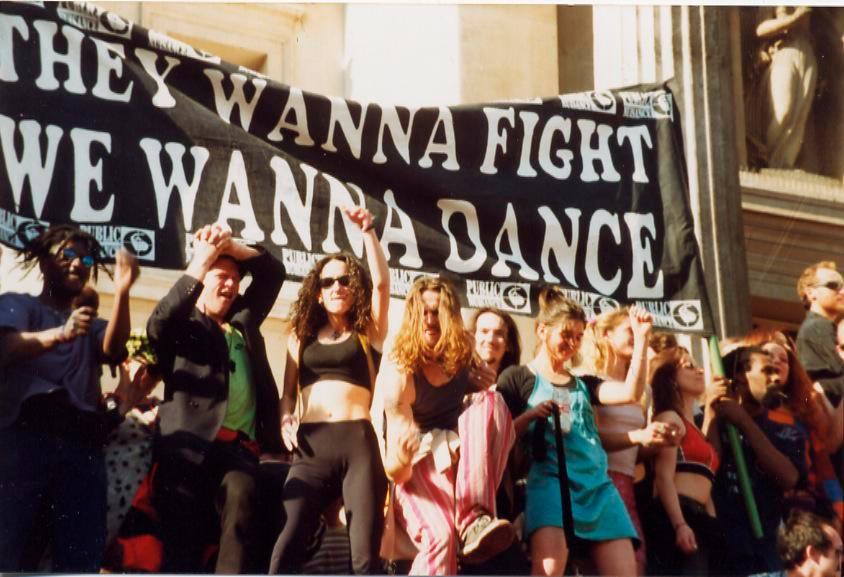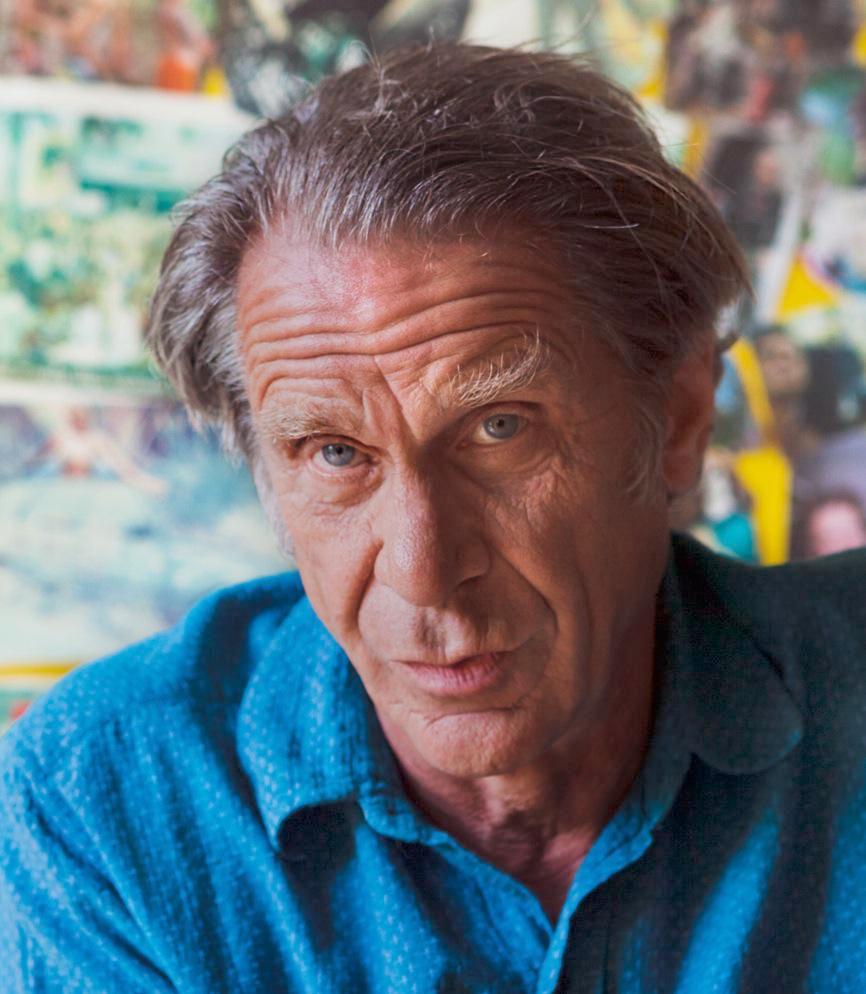[caption id="attachment5117" align="aligncenter" width="675"][](https://cdn.ecohustler.com/media/2019/03/19/we-wanna-dance.jpg) Reclaim The Streets party, held in London's Trafalgar Square, 1997[/caption] Peace, A Natural State is the preface to a new a new book by Gregory Sams called The State is Out of Date Perhaps the sentiments contained in the following pages are not yet sufficiently fashionable to procure them general favor; a long habit of not thinking a thing wrong, gives it a superficial appearance of being right, and raises at first a formidable outcry in defence of custom. But the tumult soon subsides. Time makes more converts than reason. Thomas Paine’s introduction to Common Sense – 1776 [](https://cdn.ecohustler.com/media/2019/03/19/GregorySams-TheStateisoutof_Date-Cover.jpg)Slavery was thought normal throughout the world until recent centuries; sex between men and boys was fine for ancient Greeks; for centuries it was tradition to bind women’s feet in China; for two thousand years we thought the whole universe rotated around planet Earth; for more than two centuries we have believed that democratic politics could make big government serve its citizens. Once a belief or practice endures through enough generations it is endowed with the validity of tradition and considered normal. Our trusting response to traditional practice is like the naive belief of young children that adults must know what they are doing, simply because they have been doing it for so long. Even something as bizarre as war is considered normal behavior simply because, after a few thousand years, it has assumed the cloak of tradition. As a young boy growing up in the wake of World War II, I remember thinking it perfectly plausible that if one person could bring about a great World War, as Hitler had recently done, then it must be possible for one person to bring about a great World Peace. I know better now. Zoroaster, Jesus, the Buddha, Mohammed, and other prophets and interpreters of spiritual truth have given us some great pointers to inner peace, but the religions that organized after they died have not brought peace and brotherhood to mankind. Indeed, the Abrahamic three have caused a great deal of strife, squabbling over details of just what their same God said to Whom, while believing that if we all followed their chosen version of His word, only then would we achieve global peace and harmony. But people are different, times change, and morality is best developed from within. Like many, I hoped that some inspired leader would come along, political or spiritual, to get the ball rolling in the right direction and unite us all behind their positive policies. Perhaps a combination of Christ, Gandhi, John Kennedy, and Hypatia of Alexandria would do the trick, provided this composite character could live forever. In despair of this miracle ever arising on Earth, some even anticipate imminent alien contact with a Ten Commandments type of scenario broadcast simultaneously in all languages to all televisions, cell phones, social networks, and radios across the globe. But would even this, an ultimatum from outer space, do the job?
Eventually I came to recognize that while one person’s actions can demonstrably plunge large parts of the world into war and disorder, a state of peace can never be constructed or created by the action of a single person, or a select group. It may come as a surprise to discover that a state of peace is as much the natural condition of our world as is the stability that develops in the natural rainforest. A state of balance and harmony arises as the eventual result of billions of people’s activities and interests interacting with each other and the rest of the world in a state of freedom. It is constructed from the bottom up. One person or group of people, by whatever means chosen and however enlightened or inspired, cannot determine the specific route to this state of peace. Yet somewhere in our soul we know that peace is a possible condition—something that our species is capable of achieving, despite our lengthy catalog of failures. Peace is not an absence of war; it is a virtue, a state of mind, a disposition for benevolence, confidence, justice. Baruch Spinoza, Dutch philosopher and scientist I suggest that is not a natural condition of being human that we must kill and maim each other in large numbers for quite unnecessary reasons. After meeting thousands of people in travels across different continents, cultures, and sub-cultures, I have come to realize that the vast majority of humanity is not made up of natural-born killers, or even all that evil. In fact, people are great! Our incessant attempts to forcibly put order into the chaotic and constantly changing mix of our civilization is the reason, I suggest, that we experience so much disorder, suffering, and what is often referred to as “chaos.” For too long society has been run with the belief that we are actually able to govern and control something so complex by setting ever more complicated rules and regulations. Wherever this occurs, feedback loops are broken and society’s ability to respond and evolve successfully in a changing world is artificially obstructed. This book is not about some dramatic new way to run the world, according to a plan that seems to make a lot of sense and pushes all your buttons. The world can look after itself and support human beings, as it does every other life form on the planet, if we work within its basic operating framework, which is a fundamentally free system. We perversely refuse to allow big systems the freedom to self-organize, with some thinking the perfect system will arise once they achieve control tantamount to tuning each flap of the proverbial butterfly’s wing. We ignore the underlying lesson of the science called chaos theory, which explores the self-organizing powers of complex systems. This arrogant and ignorant behavior by a dominant species threatens not only our own future but perhaps that of the planet itself. There is a way not to run the planet, and it might seem self-evident that the way it is being done today is a good example. Nevertheless, the usual approach to this situation is to assume that a change of figurehead or a radical re-arrangement of the knobs and levers of power will eventually sort things out. These pages will seek to convince you that no new combination or rearrangement of the complex controls of coercive power will work. Consider the number of states there are in the world, each run by people who believe they know what they are doing, and each tweaked to its local circumstances. Now consider the minor and major tweaking that has gone on throughout the history of the state (pharaoh, senate, church, caliph, king, emperor, prince, president, pope, military junta, parliament, dictator, etc.). There have already been many thousands of different variations and combinations attempted. None of them have worked in the long term, though some may have lasted for longer than others. Do we really believe that, for instance, version 26,733 is going to be the one that finally gets it all working smoothly and sustainably?
Each time that a new government or state takes over the reins of power, we are assured they have the right policies and programs to get the economy back on track, or at least to improve upon the existing situation. And when their programs collapse or fail they are always most adept at placing the blame elsewhere. I will seek to convince you that there are far too many elements involved in the complex system we call civilization for any single person or group of people to determine its course with coercively backed regulations, made either locally or globally, made with good intent or bad. The state does perform functions that are necessary to society. It claims the monopoly on these vital functions and does an increasingly poor job of them. We can see crime proliferating as more and more money is spent combating it, while illegal wars and the LIBOR banking fraud of 2012 do not even figure in the crime figures. We see our true health and vitality decline as more and more is spent on sickness care by the state. The widespread notion that more hospital beds and doctors are the sign of a successful “health policy” is truly the sign of a sick nation. In education, agriculture, the roads, social security, medicine and healing, power generation—wherever we look, the determined hand of the state can be seen to degrade and distort that which it seeks to manage and improve. My proposition is that the means to deal with vital functions can and eventually will arise in a freely operating society so that, for example, robbers, murderers, and identity thieves do not run amok, polluters do not have a free license to destroy our environment, nor spammers to pollute our mailbox. While we need mechanisms to deal with these areas, it is apparent that where we rely upon the state to be that mechanism, it is proving inadequate. A free society would have no difficulty with many things now thought to be unacceptable by the state. It could tolerate and naturally regulate herbalists, street traders, gambling clubs (we live with the Lottery), prostitution, recreational drug use, and many forms of activity and enterprise now banned or strictly controlled. Much of what consenting adults do with their own bodies and minds, in their own time, is still regulated by criminal law. Alternative medicines are suppressed or banned in some major nations, and many countries still jail homosexuals, or those who dare to question the prevailing government or religion. Yes, we need to manage and regulate some aspects of our culture and develop non-coercive means to do so that are more effective than big government with its growing volume of regulators, inspectors, judges, police, prosecutors, and prisons.
The state’s priorities will not change. As we will see, self-interest, self- survival and self-advancement will always be the primary concerns of any ruler or government. In a democracy, the next election will always be the politician’s foremost consideration, and the short-term interests of society will take a poor second best, with our long-term interests hardly considered. When a government is said to be “in power” it holds that power for the simple reason that it is able to make us do or not do that which it decides is in our best, or its best, interest. Whether this power was won in a political bun fight or acquired through military force often makes little difference in the long run. Once a new state is seen to have a firm grip upon the reins of power, the world will recognize it and welcome it to the family of nations. There are more questions than answers in this book. This is not a pessimistic view, but one based on the premise that our current methods of attacking the problems of the world actually block the emergence of organic working solutions. Nor will every aspect of every subject be aired, or copious examples delivered on every principle. The intention is to stir the pot rather than draft a finished recipe with measured ingredients. If I were to cite evidence supporting each point or assertion, then many of these chapters would fill a book of their own.. You can view this book as a jigsaw puzzle with a few of the pieces missing. The picture is there, and as you see it you will be in a better position to fill in the missing pieces yourself.
SUPPORTED BY HEROES LIKE YOU
Support independent eco journalism that drives real change.Everything that is really great and inspiring is created by the individual who can labor in freedom. Albert Einstein
Preface to The State Is Out Of Date – We Can Do It Better, Gregory Sams ©2013 [caption id="attachment_5118" align="aligncenter" width="520"] Gregory Sams photographed by Alan Davies[/caption]



